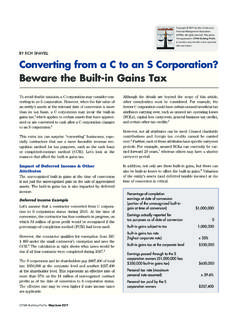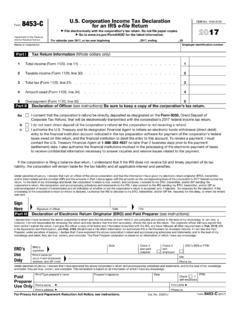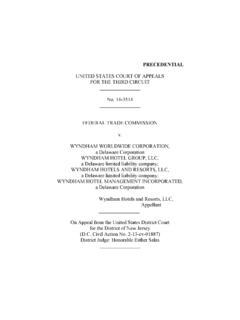Transcription of So You Want Your LLC to Be An S Corporation…
1 So You want your LLC to Be An S February 4, 2008 Feed address for Podcast subscription: Home page for Podcast: 2008 Edward K. Zollars, CPA The TaxUpdate podcast is intended for tax professionals and is not designed for those not skilled in independent tax research. All readers and listeners are expected to do their own research to confirm items raised in this presentation before relying upon the positions presented. The Podcast and this document may be reproduced freely so long as no fee is charged for the use of this document. Such prohibited use would include using this podcast or document as part of a CPE presentation for which a fee is charged. This podcast is sponsored by Leimberg Information Services, located on the web at Leimberg Information Services offers email newsletters on tax related matters, as well as access to a library of useful information to tax practitioners that subscribe to their services.
2 LLCs and S corporation Status This week s podcast deals with a topic that was suggested by an email I received from an listener to the podcast, and relates to an issue that has arisen a couple of times on the Arizona Society of CPA s listserve related to the issues that arise with LLCs that wish to be treated as an S corporation . It s an issue often not covered in depth in CPE courses and I ll admit that true of courses I do. The issue is that LLCs tend to be covered in partnership courses, while S corporation courses tend to concentrate on corporate forms. So the LLC as an S corporation tends to become an issue dealt with in passing in either course. However, there are cases where this is an option that should be considered, and there are gotchas that have to be considered in order to insure that you end up with the desired result. So You want your LLC to Be An S Podcast of February 4, 2008 Feed - 2 - The Incredible Missing Entity The regulations under 7701 govern the tax classification of entities for federal income tax purposes, and these definitions have to fit the items described in the Internal Revenue Code.
3 While the IRC talks about corporations, partnerships, trusts and estates, it never mentions the thing known as a limited liability company or LLC. That s not an accident. LLCs first appeared in Wyoming in the 1970s, and they were designed specifically to be an entity that wasn t one of those described in the Internal Code. They were meant to allow the use of an entity that limited the liability of all owners, allowed full participation in management by any or all owners, and still gave us the ability to flow through income and use special allocations. While limited partnerships, other partnerships and corporations could have given us some of those features, none could have given us all of those features in the same entity but LLCs were meant to do that. The fact LLCs weren t specifically defined in the IRC doesn t mean the entity didn t have a tax responsibility rather, it meant that for federal tax purposes it was going to be classified as one of the things the IRC does define.
4 Before check the box we had the exercise of deciding if our LLC had too many corporate features and was going to be taxed as a corporation , or whether it could maintain partnership tax treatment. But what it was for federal tax purposes, that was the treatment of the entity for all federal tax So if your LLC was a corporation , it had exactly the same standing as a entity that was formed as a corporation under state law. So, for instance (and the subject of today s podcast), the entity could elect S status so long as it met the other requirements of electing S status besides the basic one of being a corporation for tax purposes. Check the box simplified our classification issues, but it didn t change the fact that once the classification is determined, the entity is taxed the same as any other legal entity that is treated as the same type of tax entity. What check the box did do, though, was allow us to pick and choose which type of entity we wanted our LLC to be treated as rather than having it go through a sieve of attributes that then placed it into a single box.
5 Generally, LLCs have two options a default (which is based on how many owners it has) or electing to be 1 OK, actually that overstates things a bit. If the fact the entity is an LLC has a nontax impact, that can spill over to the tax treatment. For instance, the fact that the LLC limits the liability of the members can cause tax issues, but that s related to the fact that we have debt for which the member is not liable and the same problems would arise in a traditional partnership if you have a debt the partner isn t liable for. So You want your LLC to Be An S Podcast of February 4, 2008 Feed - 3 - treated as a Many CPAs I hear discuss LLCs seem to miss this point, mechanically equating LLCs with partnerships, or still attempting to apply partnership taxation concepts to LLCs that either have only a single member or which have elected corporate treatment. Federal tax law simply doesn t work that way rather, once we ve got the entity classified we ignore the fact that is may be organized under the state LLC statute.
6 Arizona law (and most other state income tax laws) follow the same treatment. Note that California is one rather major exception among the minority of states that pay some attention to the entity being an LLC for tax purposes. Checking the Box Domestic LLCs have a default classification based on the number of owners it has. If the entity has a single owner, it is disregarded as an entity separate from its owner [Reg. (b)(1)(ii)]. Note that if the entity that owns the LLC is a partnership, that single member LLC would be ignored, and its assets would be treated as owned by the partnership. Similarly, if the owner of the LLC is a corporation , we also ignore the LLC and treat the assets as if owned directly by the corporation . If the entity has more than one owner, the default treatment is as a partnership [Reg. (b)(1)(i)]. Election to Take Either type of entity can elect, instead of its default treatment, to be treated as an association [Reg.]
7 (a)] which means a corporation for these purposes (see the definition of a corporation at 7701(a)(3)). The election is made in accordance with the provisions found in Reg. (c). Reg. (c)(1)(i) describes the general rule for how elections are handled. It provides (c) Elections (1) Time and place for filing (i) In general. Except as provided in paragraphs (c)(1)(iv) and (v) of this 2 Note that a foreign LLC may end up with its default treatment being corporate, with an optional election to be treated as a partnership but that s beyond today s podcast. Just be aware that if you have an LLC formed under the laws of another country, you should strongly consider filing a Form 8832 as a protective measure no matter what classification you want . See Reg. (b)(2). So You want your LLC to Be An S Podcast of February 4, 2008 Feed - 4 - section, an eligible entity may elect to be classified other than as provided under paragraph (b) of this section, or to change its classification, by filing Form 8832, Entity Classification Election, with the service center designated on Form 8832.
8 An election will not be accepted unless all of the information required by the form and instructions, including the taxpayer identifying number of the entity, is provided on Form 8832. See section for rules on applying for and displaying Employer Identification Numbers. The election is effective as of the date filed unless a different date is specified on the Form 8832 something you would almost always want to do. That specified date can be up to 75 days before the date the election is filed, or 12 months after the date of filing [Reg. (c)(1)(iii)]. That means that both prospective and retroactive changes are allowed. Having corporate status, you can elect S if the entity is eligible. Originally that was done by filing a Form 2553 within 75 days of the effective date of your 8832 election but that created a number of issues. The problem was that the IRS might very well try to process the 2553 before the 8832 was processed, creating a situation where it appeared that a partnership was attempting to elect S status.
9 Since a partnership can t elect S (that s a corporate election), the election would be bounced as invalid. However, the 8832 continued to make its way through the system and eventually was accepted. This resulted in significant correspondence to sort out the situation and eventually convince the IRS computer systems and IRS personnel that there was a timely filed valid S corporation election. To eliminate that issue, Reg. (c)(1)(v)(C) provided a short cut election for an entity that wished to both elect to change its status to corporation and then have S treatment for that corporation . That provision provides that: (C) S corporations. An eligible entity that timely elects to be an S corporation under section 1362(a)(1) is treated as having made an election under this section to be classified as an association, provided that (as of the effective date of the election under section 1362(a)(1)) the entity meets all other requirements to qualify as a small business corporation under section 1361(b).
10 Subject to (c)(1)(iv), the deemed election to be classified as an association will apply as of the effective date of the S corporation election and will remain in effect until the entity makes a valid election, under (c)(1)(i), to be classified as other than an association. Note that the treatment as an association is conditioned upon being eligible to be treated as an S corporation as of the date of election so if it turns out the entity was not eligible to be an S corporation , the 8832 election is also invalid per the terms of this regulation. So You want your LLC to Be An S Podcast of February 4, 2008 Feed - 5 - If, for some reason, the taxpayer wants the corporate election to stand even if it later is found that the corporation was not eligible to be an S corporation , it would appear that the taxpayer would need to file a protective 8832 that would take effect regardless of the initial validity of the S status.







